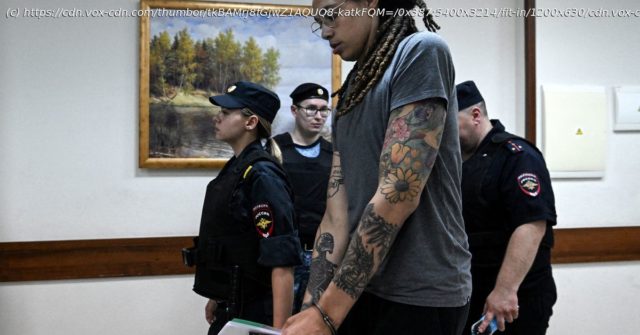A scholar on hostage negotiations explains.
On Thursday, a Russian court sentenced basketball star Brittney Griner to nine years in a penal colony. Griner, who was playing in a Russian league during the offseason just ahead of Russia’s invasion of Ukraine, was found with about a gram of hash oil and received nearly the maximum sentence after being found guilty of drug trafficking.
Now that the trial is over, Griner’s situation is revealed for what it always was: hard-core geopolitics.
The Phoenix Mercury women’s basketball superstar is caught between Russia and the US, competing powers on opposite sides of the Ukraine war. “It’s unacceptable, and I call on Russia to release her immediately so she can be with her wife, loved ones, friends, and teammates,” President Joe Biden said in a statement. The US State Department has been attempting to negotiate for her release, possibly through a prisoner swap, and Secretary of State Antony Blinken said the sentencing “further compounds the injustice of her wrongful detention.”
Griner is not a hostage per se, but scholar Danielle Gilbert says that it’s part of strategy that Russia is deploying called hostage diplomacy, where the country is using the basketball player as a pawn to extract concessions from the US.
Griner’s case has “enormously raised the profile of this phenomenon,” Gilbert said. But she’s far from the first to be victim to it.
“One thing to remember in these cases is that we’re never talking about exchanging prisoners with our friends. So anytime that there’s one of these prisoner swaps, it’s with a US adversary,” Gilbert said. “The good news is that even when there have been geopolitical tensions between the United States and another country, that these deals are still able to go through.”
To understand the complex dynamics of Griner’s situation — and what it might look like going forward — I spoke with Gilbert, who is a fellow at Dartmouth College and assistant professor at the United States Air Force Academy. Gilbert is writing a book on why states and rogue actors take hostages and how their freedom is negotiated.
This conversation has been lightly edited for clarity.
Brittney Griner isn’t the first American detained in a foreign country. Former Marine Trevor Reed was returned home in a prisoner swap with Russia earlier this year after being detained since 2019.
Give us a sense of how these negotiations work. Why do they take so long? Why are they mostly behind closed doors?
Negotiations in these kinds of cases are extremely high stakes. These are leaders of adversarial governments who are trying to find common ground to bring their citizens home or other diplomatic concessions.
So the same way that we would consider it difficult for the US and Russia to negotiate about any other political issues on the world stage right now, these cases often take months or years to play out. There are Americans who’ve been wrongfully detained or held hostage overseas for as much as a decade, and many for five years or more. It’s not that the two sides are sitting down across the table from each other every day and finding it impossible to negotiate. But they are thinking about all of the different foreign policy interests they have, and how to get the best bargain that they can.
Would you describe Griner’s situation as hostage taking? I understand these are really trumped up charges.
I’m really careful about when I use the word hostage or hostage taking in these kinds of situations. People are sometimes very casual about what they call a hostage taking. Specifically, I would consider it “hostage diplomacy,” which is when states use their criminal justice system to arrest foreigners with the intention of using them for foreign policy leverage.
Yes, she is arrested, she pled guilty to a crime. Russia has a criminal justice system, she broke the law. However, the fact that they have accused her and sentenced her with international drug smuggling, which she clearly was not doing and didn’t intend to do. The fact that they sentenced her to a nine-and-a half-year prison sentence, which is completely outside the norm of what someone would get for the amount of drugs she had in her possession.






